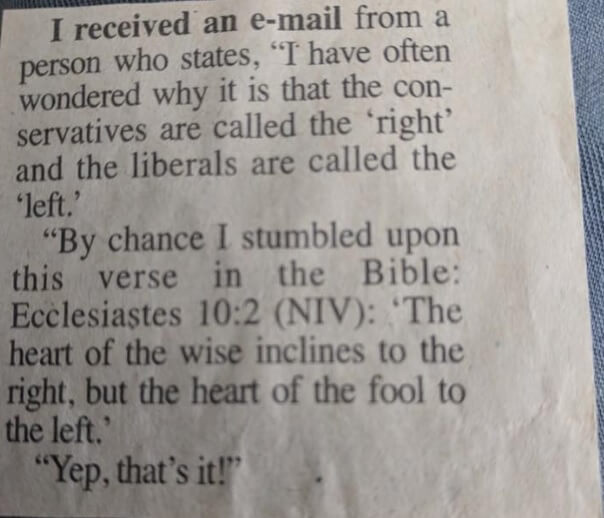Newspaper Finally Answers the Question: Why Conservatives Are Called 'the Right'
So, why are conservatives called the “right-wing” and liberals called the “left-wing?”
One might have been excused for thinking that the term began because conservatives were always right but liberal language police thought “wrong” sounded like a politically incorrect word for liberal, so we all decided to compromise and go with left.
Alas, this definitely isn’t it, but a man can always dream.
However, one newspaper ran an etymology of the phrase that is completely “right” without necessarily being correct in the historical sense. We don’t quite know provenance of this one, but it gave us a good laugh.

“I received an email from a person who states, ‘I have often wondered why it is that the conservatives are called the ‘right’ and the liberals are called the ‘left.’
“By chance I stumbled upon this verse in the Bible: Ecclesiastes 10:2 (NIV): ‘The heart of the wise inclines to the right, but the heart of the fool to the left.’
“Yep, that’s it!” the short blurb concludes.
 Well, as Faulkner once noted, “The best fiction is far more true than any journalism.” This certainly deserves to be the true explanation, but isn’t.
Well, as Faulkner once noted, “The best fiction is far more true than any journalism.” This certainly deserves to be the true explanation, but isn’t.
The term actually dates from the time of the French Revolution, when the French National Assembly met in the summer of 1789 to draft a constitution. The aristocratic royalist contingent, which believed that King Louis XVI should retain more power, sat to the right of the presiding officer. The anti-royalist revolutionary contingent, meanwhile, sat on the left.
“I tried to sit in different parts of the hall and not to adopt any marked spot, so as to remain more the master of my opinion,” a right-wing baron wrote, according to the History Channel, “but I was compelled absolutely to abandon the left or else be condemned always to vote alone and thus be subjected to jeers from the galleries.”
Of course, Louis XVI would be dead within four years and so would the monarchy, which pretty much put an end to any debate regarding how much power the king ought to have.
The terms left-wing and right-wing caught on with the French press, however. They would disappear again during Napoleon’s reign but returned along with the Bourbon Restoration and constitutional monarchy.
While the terms diffused among the wider world during the 19th century, it wasn’t until the early 20th century that they began being used in the United States.
It’s worth noting, however, that in the House and Senate the arrangement is reversed from the French plan — the Republicans sit on the left, the Democrats on the right. Such are the peculiarities of global politics. (For instance, red is typically associated with socialism or left-leaning movements, yet thanks to NBC’s 2000 election map we have the opposite coloring scheme here.)
Yet, there is a grain of truth laid out in Ecclesiastes. After all, the book is supposed to be a king passing on his wisdom. And God can predict all things, of course. That includes the French Revolution, where the delegates would sit and the fact that it would be used as a shorthand for political ideology for two-plus centuries to come.
When you think about it, maybe the Ecclesiastes explanation makes a bit of sense, after all.
Truth and Accuracy
We are committed to truth and accuracy in all of our journalism. Read our editorial standards.












